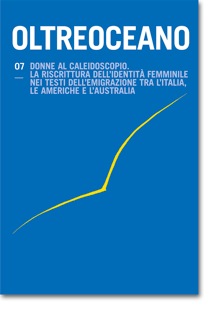Scrittura migrante e postmodernità: lo sguardo femminile tra frammentarietà caleidoscopica e transcodificazione
Keywords:
scrittura migrante, postmodernità, scrittura femminileAbstract
A partire dagli anni Settanta del XX secolo, quando si afferma negli Stati Uniti il Postmodernismo, nella scrittura si evidenziano nuove strategie narrative di decostruzione parodica degli stereotipi correnti e il passaggio da un vecchio a un nuovo canone letterario. Anche le scrittrici, nel ricomporre i frammenti della propria identità per ricreare una nuova immagine femminile, affrontano il tema dell’emigrazione della donna alla luce di una riscrittura che, aperta alla precarietà di ogni senso, ad altri sguardi e ad altri desideri, moltiplica prospettive e lascia intravvedere un’ambiguità ontologica.
Migrant Writing and Postmodernity: the Female Gaze between Kaleidoscopic Fragmentation and Transcoding
Stemming from the 1970’s – and the assertion of Postmodernism in the USA – new narrative strategies of parodic deconstrucion of current stereotypes together with a shift from the old to a new literary canon took over. In trying to recompose the fragments of their own identity into a new feminine image, women writers themselves moved to dealing with the theme of migration from a different stand-point which, facing the generalized uncertainty and unstable ambitions, multiplies perspectives and hints at a different ontological ambiguity.
Downloads
References
Bellini, G. (2011): Idea de la mujer en la literatura hispanoamericana. De Colón al siglo XX. Roma: Bulzoni.
Borges, J. L. (1984): Epilogo. In J. L. Borges, El hacedor. Tutte le opere, I (pp. 1094-1267). D. Porzio (Ed.). Milano: Mondadori.
Chiurazzi, G. (2002): Il postmoderno. Il pensiero nella società della comunicazione. Milano: Paravia Bruno Mondadori.
Deleuze, G. & Guattari, F. (2006): Mille Piani. Capitalismo e schizofrenia. Roma: Castelvecchi.
Lyotard, J. F. (1982): La condizione postmoderna. Milano: Feltrinelli.
Mayos Solsona, G. (2010): Baudrillard e la sociedad simulacro. METROPOLIS. Revista d’informació i pensament urbans, 78, pp. 36-40. Recuperato da http://www.ub.edu/histofilosofia/gmayos/5presentacio.htm
Pynchon, Th. (2012): Jean Francois Lyotard e la postmodernità. Recuperato da http://www.parodos.it/anapliromatica/art/celebrates/pynchon3.htm
Pynchon, Th. (2012): Biografia. Recuperato da www.parodos.it/news/quattrocento_libri_sono_tanto_o.htm
Touraine, A. (2012): Il mondo è delle donne. Milano: Il Saggiatore.
Vattimo, G. (1987): La fine della modernità. Nichilismo ed ermeneutica nella cultura postmoderna. Milano: Garzanti.
Wikipedia (2012): Voce Letteratura postmoderna. Recuperato da https://it.wikipedia.org/wiki/Letteratura_postmoderna
Wikipedia (2012): Voce Postmodernismo. Recuperato da https://it.wikipedia.org/wiki/Postmodernismo
Downloads
Published
How to Cite
Issue
Section
License

This work is licensed under a Creative Commons Attribution-NonCommercial-ShareAlike 4.0 International License.
The authors undertake to comply with the following conditions, which are considered accepted at the time of submission of their contributions.
The sending of a text implies that it is unpublished and not submitted to be published elsewhere.
1. If accepted, the author shall confer on the publisher the right to publish and distribute it both in paper form and in the online electronic edition. The published articles will be downloadable and made available in open access.
2. Provided that it correctly indicates that the first publication took place in the journal Oltreoceano. Rivista sulle migrazioni the author has the right to: a) reproduce the article in separate extracts or collected in a volume; b) publish the article on their personal website or teaching site provided that these sites are of a non-commercial nature; c) deposit the article in online archives of a non-commercial nature, linked to the institution they belong to or as part of projects for the non-commercial dissemination and open access of scientific works.
The use of contributions by third parties, for commercial or otherwise unauthorized purposes, is not allowed. The publisher declines all responsibility for the unauthorized use of the material published in the journal.












